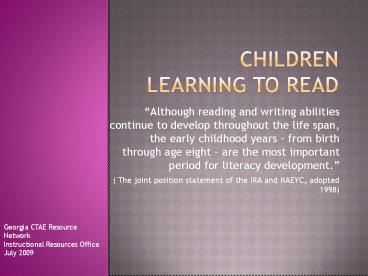Children Learning to Read - PowerPoint PPT Presentation
1 / 15
Title:
Children Learning to Read
Description:
... stages of writing Share books with children Talk about letters by name and sounds Establish a literacy-rich environment Re-read favorite stories Play language ... – PowerPoint PPT presentation
Number of Views:146
Avg rating:3.0/5.0
Title: Children Learning to Read
1
Children Learning to Read
- Although reading and writing abilities continue
to develop throughout the life span, the early
childhood years from birth through age eight
are the most important period for literacy
development. - ( The joint position statement of the IRA and
NAEYC, adopted 1998)
Georgia CTAE Resource Network Instructional
Resources Office July 2009
2
Familiarize Children with Concepts of Print
- Concepts of print refers to the knowledge of the
functions (practical uses), structure (printed
words are separated by spaces), and conventions
(print is read from front to back, left-to-right,
and top to bottom) of written language.
3
Our Responsibility
- The children who make good progress in learning
to read during the first grade are usually those
who enter with considerable book experience under
their belts. - (From Much More than ABCs by Juditth A.
Schickendanz, NAEYC, 1999)
4
How do Children learn Language?
- When they are in environments where language is
used - When they have meaningful interaction with others
5
What can YOU do?
- Be aware of the development of the stages of
writing - Share books with children
- Talk about letters by name and sounds
- Establish a literacy-rich environment
- Re-read favorite stories
- Play language games
- Encourage children to experiment with writing
- Have children keep journals
6
How should you select books for 3-4 year olds?
- Realistic pictures
- Interesting story line or plot
- SHORT plot
- Rhyming words
- Repetitive words or phrases
- Use variety fiction, poetry, non-fiction
- Beautiful language
- Use stories that they are interested in or appeal
to them
7
How would you select books for 4-5 year olds?
- Plot can be longer, humorous, and silly.
- If Children Get Restless or Bored
- Add more drama to the voices
- Shorten the story
- End the story immediately
8
How do you prepare to tell a story?
- Read it through Know the story!
- Practice, Practice, Practice!
- Make props and visuals
- Prepare vocal and facial expression
- Prepare an active setting
- Make it FUN!!!
9
How do you Begin?
- Introduce the book by reading the title and
showing children the front of the book. - Tell the Author and Illustrator. Define what
both of those mean. - Ask the children to predict what the story will
be about. - Occasionally review Use/Care of Books as well as
words like spine of book.
10
Effective Techniques
- Pass hand or pointer under print as you read.
- Take time to call attention to capital letters,
punctuation, illustrations, authors use of
words, rhyming patterns, spelling patterns, page
numbers, phonemic awareness, teach vocabulary,
etc - Ask 5 questions during/after the story
(open-ended).
- Factual
- Inferential
- Applicative
- Compare and Contrast
- Cause and Effect
- Patterns and Sequence
- Predicting
11
Story Stretchers
- An activity to reinforce the concept, message, or
moral to a story - Stretchers extend story time and help children
remember the story - Adds a hands-on element to story time
12
Examples
- Make a collage
- Make a word wall with words from the story
- Draw own illustrations of the story
- Re-write the outcome
- Act out the story
- Color a picture
- Create a craft
13
Helpful Websites
- http//www.youcanteach.com/storystretchers.php
- http//www.atozteacherstuff.com/Lesson_Plans/Liter
ature_Activities/ - http//www.dltk-kids.com/books/
14
Class Books
- Familiarize children with concepts of print
- Develop fine motor skills
- Share literacy activities with families
- Give children meaningful experiences with print
15
Examples.
- Books about children
- Creative Books
- Alphabet Books
- Counting Books
- Song or Poem Books
- New Knowledge Books

